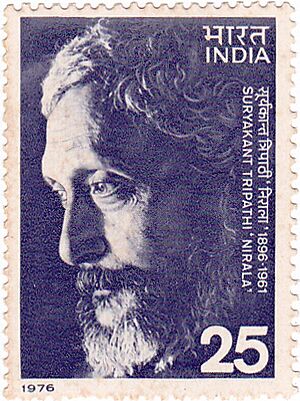Suryakant Tripathi facts for kids
Quick facts for kids
Suryakant Tripathi
|
|
|---|---|

Tripathi on a 1976 stamp of India
|
|
| Born | 21 February 1899 Midnapore, Bengal Presidency, British India |
| Died | 15 October 1961 (aged 64) Allahabad, Uttar Pradesh, India |
| Pen name | Nirala |
| Occupation |
|
| Nationality | Indian |
| Period | Chhayavaad |
| Notable works | Saroj Smriti, Raam Ki Shaktipuja |
| Spouse | Manohara Devi |
|
|
|
Suryakant Tripathi (born February 21, 1899 – died October 15, 1961) was a famous Indian writer. People often knew him by his pen name, Nirala. He wrote many things in Hindi language, like poems, stories, and essays. He was also an artist who drew pictures of people and places from his time.
Contents
Life Story of Suryakant Tripathi
Tripathi was born on February 21, 1899. His birthplace was Mahishadal in Midnapore, which was part of the Bengal Presidency in British India. His family belonged to the Kanyakubja Brahmin group.
Nirala's father, Pandit Ramsahaya Tripathi, worked for the government. His mother passed away when he was very young. Nirala went to school in Mahishadal, where he learned in the Bengali language.
Later, he moved to Lucknow and then to a village called Gadhakola in Unnao district. This village was his father's original home. As he grew up, he found inspiration from important people like Ramakrishna Paramhansa, Swami Vivekananda, and Rabindranath Tagore.
Family Life and Challenges
When Nirala was 20 years old, he got married to Manohara Devi. She encouraged him to learn Hindi. Soon, he started writing poems in Hindi instead of Bengali.
After a difficult childhood, Nirala had some happy years with his wife. But this good time did not last long. His wife died when he was only 22. Later, his daughter also passed away. Nirala lost many family members, including his wife and daughter, during a big flu outbreak around 1918.
Much of his life was lived in a free-spirited way. He wrote strongly against unfairness and exploitation in society. Because he was a bit of a rebel in his writing style and topics, it was hard for his work to be accepted easily. Instead, he often faced criticism. These challenges may have led to him facing mental health difficulties later in his life.
His Important Works
Many of Nirala's poems were translated into English by David Rubin. You can find them in collections like A Season on the Earth: Selected Poems of Nirala. Other books include The Return of Sarasvati: Four Hindi Poets and Of Love and War: A Chayavad Anthology.
A book called Nirala : Aatmhanta Astha was written by Doodhnath Singh. This book looked closely at Nirala's writings and ideas.
Nirala's Legacy
Today, several places are named after Suryakant Tripathi "Nirala". In the Unnao district, there is a park called Nirala Uddyan. There is also an auditorium, Nirala Prekshagrah, and a college, Mahapran Nirala Degree College, named in his honor.

